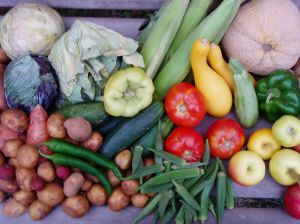By Rita Brhel, managing editor and attachment parenting resource leader (API)
 Of all the changes that take place in a woman’s body during pregnancy, the most uncomfortable for an estimated 70 percent of women – as reported by www.mayoclinic.com – may be so-called “morning sickness,” which isn’t often confined to just the morning hours.
Of all the changes that take place in a woman’s body during pregnancy, the most uncomfortable for an estimated 70 percent of women – as reported by www.mayoclinic.com – may be so-called “morning sickness,” which isn’t often confined to just the morning hours.
Not every woman who experiences morning sickness finds it debilitating, although other pregnancy signs such as exhaustion, aversions to foods, and sensitivity to odors can aggravate the condition. Morning sickness can range from a loss of appetite and mild nausea to vomiting several times a day, which can lead to dehydration or worse.
For those with more severe morning sickness or morning sickness that lasts longer than the first four months, when many women begin to feel better, eating can become a chore – especially when you’re aware that your eating habits are affecting a new, little life!
Many medical professionals request that their pregnant patients be diligent in taking a daily dose of prenatal vitamin, to be sure that the mother is getting enough nutrition from what her diet.
“The increased demand for blood and hormones raises nutritional demands for the mother,” writes Wendy Hodsdon, ND, in her 2007 article “Prenatal Vitamins: Why Pregnant Women Should Take Them” on www.thedietchannel.com. “Since her fetus is completely dependent on her for nutrition, her body will give it what it needs, depleting her stores, if necessary. This will exacerbate any nutritional deficiencies she may already be experiencing.”
The medical community, as a whole, isn’t entirely certain what causes morning sickness, although many blame a rapid increase in hormones supporting the pregnancy, a sluggish digestive system, low blood sugar, and other possibilities. Sometimes, morning sickness seems genetic, and rarely, it may be related to a complication.
But, according to http://survivemorningsickness.com, the incidence and severity of morning sickness may actually be a result of a woman’s diet. One 2006 study shows that a link with diets rich in sugars, sweeteners, oils used in frying, alcohol, and caffeine; and that women who eat more cereals and pulse foods tend not to have morning sickness.
Still, women shouldn’t force themselves to eat foods to which they have aversions. Fortunately, there are many choices in nutrient-rich foods. Here are some tips for women from SurviveMorningSickness.com to be sure they’re eating right when their pregnant:
- Do take a prenatal vitamin – Sometimes, the iron in the vitamin can temporarily increase nausea. Talk to your doctor about other brands of prenatal vitamins that may have lesser amounts of this nutrient, while still within the recommended guidelines, and about improving your intake of foods naturally containing large amounts of iron.
- Take an extra folate supplement – Women who do not get enough folic acid in their diet can get extremely ill. The recommended guideline is at least 400 micrograms per day.
- Take an extra vitamin B6 supplement – Vitamin B6 can be very effective at relieving morning sickness. The recommended dose is 50 milligrams daily. Be sure to check your prenatal vitamins to make certain your intake of this vitamin doesn’t exceed the maximum 75 milligrams each day. When using vitamin B6 to treat morning sickness, it’s best to divide the dose into three, taking one in the morning, mid-afternoon, and at bedtime.
- Eat more foods containing iron, less salt – Iron-rich foods include red meat, eggs, chicken, fish, whole grains, spinach, and raisins.
- Eat more foods containing folic acid – Folic acid-rich foods include bananas, strawberries, oranges, green vegetables, chickpeas, nuts, and cereals.
- Eat more foods containing vitamin C – Tomato and orange juice taken with meals or prenatal vitamins helps the body better absorb iron.
- Eat more foods containing calcium – Not only milk, yogurt, and cheese but also fish like salmon and sardines.
- Eat more fiber – Fiber-containing foods include cereals, breads, rice, oats, and pasta made of whole grain, as well as unpeeled fruits and vegetables. As an added bonus, fiber prevents constipation.
- Eat more foods containing protein – Foods high in protein include meat, chicken, fish, nuts, tofu, dried beans, peas, milk, and cheese.
- Eat more foods containing vitamin B6 – Try green, leafy vegetables.
- Drink six to eight glasses of water daily – Drinking lots of water helps many women, ill or not, feel better. It helps prevent urinary tract infections, which can cause nausea and other discomforts, and if left untreated, can result in premature labor. Drinking plenty of water also decreases Braxton-Hicks contractions, especially in hot weather.
- Eat more fruits and vegetables – Especially during snacks, opt for fruits and vegetables over breads and sweets.
- Eat some fish – Some medical doctors advise against eating too much fish due to the risk of ingesting mercury, but eating some fish is part of a healthy diet.
- When drinking soy milk, be sure it’s enriched with calcium.
- Avoid coffee, cola, chocolate, and other caffeinated foods.
- Avoid fatty or fried foods.
Other tips include:
- Get plenty of rest.
- Stay away from triggers – If a certain odor or food brings on the morning sickness, try to avoid it.
- Consult your medical provider – If you’re unable to keep anything down, not even fluids, it’s imperative that you contact your health practitioner, as this can lead to not only dehydration but also production of toxic ketones, which are caused when the body begins to metabolize fat for energy. Immediate treatment for severe morning sickness is typically hospitalization and intravenous fluid treatments; long-term treatment may include pressure point therapy for motion sickness or sometimes medication.
The incidence and severity of morning sickness may actually be a result of a woman’s diet.